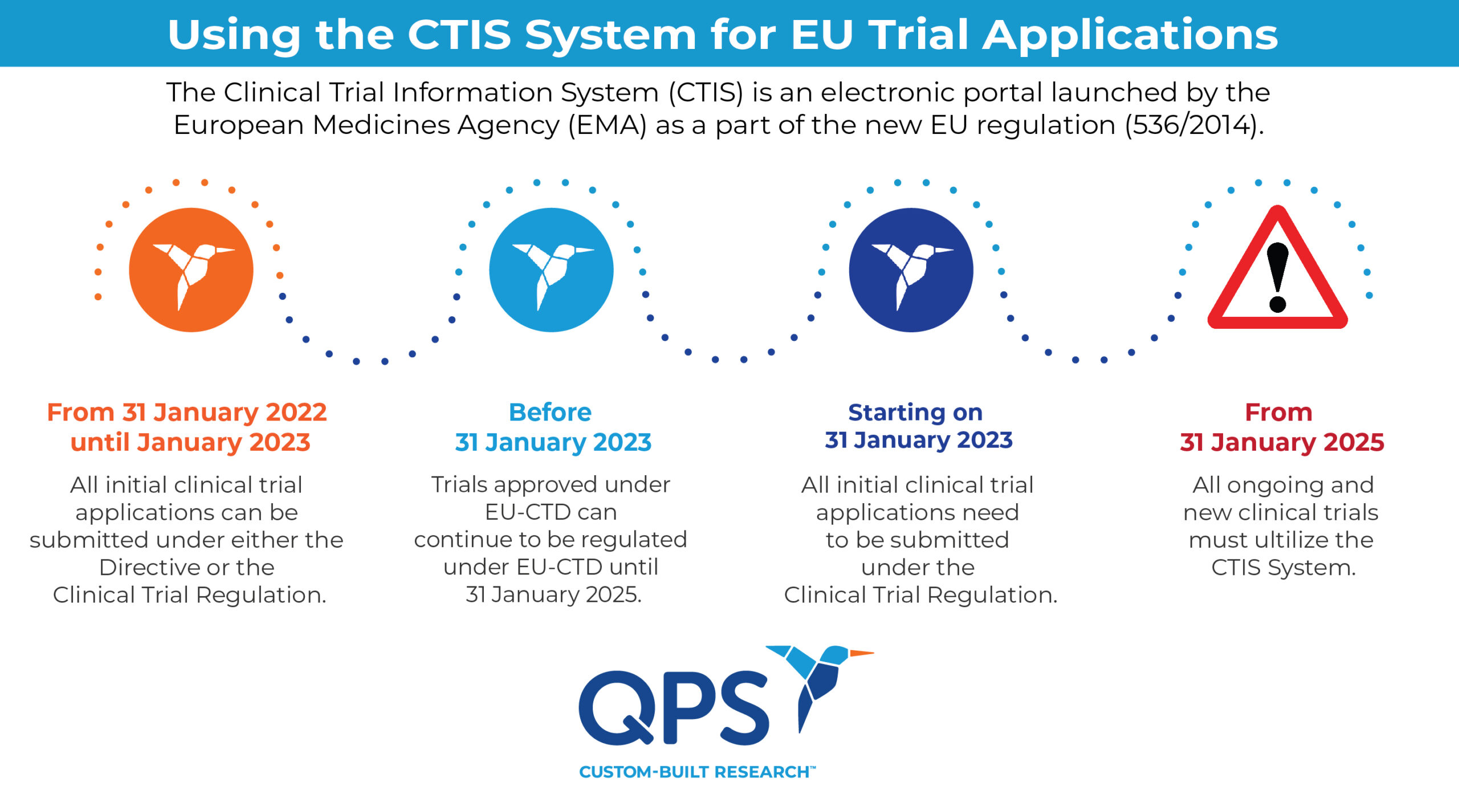As reported in our previous CTIS-related blog post, the way clinical trials are documented in the European Union (EU) is changing. By January 31, 2025, all ongoing clinical trials must move to the Clinical Trials Information System (CTIS). This date will mark the end of a 3-year transition period, which started when the EU Clinical Trial Regulation 536/2014 (EU-CTR) became effective on January 31, 2022. This blog will answer common questions that clinical trial sponsors have about the changes.
What is EU Clinical Trial Regulation 536/2014 (EU-CTR)?
The EU-CTR is a regulatory framework established by the EU to streamline and harmonize the conduct of clinical trials across member states. It aims to enhance transparency, efficiency, and patient safety in assessing and authorizing clinical trials within the EU.
What is the Clinical Trial Information System?
The CTIS is a centralized database developed by the European Medicines Agency (EMA) to support the implementation of the EU CTR. It serves as a single-entry point for the submission, assessment, and supervision of clinical trial applications within the EU. CTIS aims to streamline and harmonize the regulatory processes associated with clinical trials.
What is the timeline for compliance with the EU-CTR?
Starting January 31, 2023, all clinical trial applications are subject to EU-CTR. Trials approved under the EU Clinical Trials Directive (CTD) before January 31, 2023, can continue to be regulated under EU-CTD until January 31, 2025.
Starting January 31, 2025: All clinical trials will be regulated under EU-CTR.
What is the new trial application process under EU-CTR?
An initial clinical trial application is divided into three phases: validation, assessment, and decision. The assessment phase is divided into two parts, which the sponsor may submit sequentially or in parallel. Each phase has its own timelines and required activities.
What are the two parts of the assessment phase?
For Part I, the following documents must be submitted for scientific/regulatory review: protocol, investigator brochure (IB), investigational medicinal product dossier (IMPD), good manufacturing practices (GMP) documents, label, and translations as required by each member state.
For Part II, the following documents must be submitted for ethical review: trial site information, recruitment arrangements, informed consent form (ICF), suitability of investigator, suitability of facilities, financial arrangements and general data protection regulation (GDPR) documentation.
Which clinical trials need to be transitioned to CTR/CTIS?
Clinical trials authorized under the CTD that are expected to continue beyond January 30, 2025, must be transitioned to the CTR. Only interventional clinical trials with at least one active site in the EU must be transitioned.
For more information, see How to Get Started and How to Transition a Trial.
What is the deadline for transitioning ongoing trials to CTIS?
Sponsors can transition clinical trials from the EU-CTD to the EU-CTR anytime until the end of the 3-year transition period, on January 31, 2025, without discontinuing a clinical trial or putting it on hold.
Sponsors should, however, consider the months-long process necessary for completing the transition and are strongly advised to submit applications as soon as possible.
What challenges should sponsors be prepared for regarding compliance with the EU-CTR?
Transition-related challenges for sponsors may include:
- Accelerated response timelines: The EU-CTR limits sponsors to shorter timeframes for responding to application queries or requests for information.
- Transitioning existing trials: Moving ongoing trials to the CTIS can be complex and time-consuming, requiring careful planning and execution.
- Technical challenges: Implementing and navigating the CTIS platform may present technical hurdles for sponsors, such as data entry, system integration, and troubleshooting.
How can clinical trial sponsors prepare for EU-CTR compliance?
To navigate the transition and ensure compliance, sponsors should consider the following recommendations:
- Conduct impact evaluations: Assess the potential impact of EU-CTR requirements on current operations and workflows and develop strategies to address any challenges or gaps.
- Train CTIS users: Provide comprehensive training to staff members responsible for using CTIS, ensuring they are proficient in navigating the platform and fulfilling regulatory obligations.
- Dedicate resources: Allocate sufficient resources, including personnel and expertise, to support the transition to CTIS and ongoing compliance efforts.
How can QPS help sponsors more effectively manage clinical trial information?
As a reliable and experienced clinical trials partner, QPS can support sponsors throughout the transition. Our experts can help with many essential transition responsibilities, including the following:
- Conducting a comprehensive gap analysis of existing documentation to ensure alignment with EUCTR requirements.
- Developing a redaction and deferral strategy to protect sensitive information while ensuring timely disclosure.
- Managing the compilation, validation, submission, and lifecycle of the clinical trial application (CTA) through CTIS.
- Performing CTIS transition services for interventional clinical trials that will continue beyond January 30, 2025.
- Providing training on CTIS usage and drafting supporting standard operating procedures to facilitate smooth transition and compliance.
By proactively addressing and preparing for the transition to CTIS, sponsors can implement effective strategies and ensure compliance with EUCTR requirements. Contact QPS for more information and assistance.
Did you enjoy this blog post? Check out our other blog posts as well as related topics on our Webinar page.
QPS is a GLP- and GCP-compliant contract research organization (CRO) delivering the highest grade of discovery, preclinical and clinical drug research development services. Since 1995, it has grown from a tiny bioanalysis shop to a full-service CRO with 1,200+ employees in the U.S., Europe and Asia. Today, QPS offers expanded pharmaceutical contract R&D services with special expertise in neuropharmacology, DMPK, toxicology, bioanalysis, translational medicine and clinical development. An award-winning leader focused on bioanalytics and clinical trials, QPS is known for proven quality standards, technical expertise, a flexible approach to research, client satisfaction and turnkey laboratories and facilities. Through continual enhancements in capacities and resources, QPS stands tall in its commitment to delivering superior quality, skilled performance and trusted service to its valued customers. For more information, visit www.qps.com or email [email protected].






